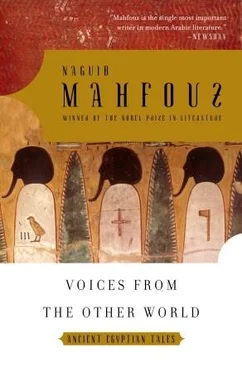My dear sirs. . There are times when I am beset by confusion, when I am wracked with doubt. So I ask myself, was what I saw real, or a deception? Perhaps, at times, I have a tendency to lie to myself. Yet each time that I incline toward disbelief, I am confronted by facts over which I have no control. What do you say, for example, to the testimony of Shaykh Jadallah, a living person ready and able to repeat to you what I have relayed? And what is your reply to the two pathetic servants, who were driven insane? And what of the tomb of Hor, and the now-deserted palace? And, above all else, what of the death of Mahmoud Pasha al-Arna’uti— which all the readers of the press remember with the utmost sense of wonder?

The incredible news spread through every part of Pharaoh’s palace. Every tongue told it, all ears listened eagerly to it, and the stunned gossips repeated it — that a messenger from the land of the Amorites had descended upon Egypt. He bore a letter to Pharaoh from Prince Sinuhe, who had vanished without warning all of forty years before — and whose disappearance itself had wreaked havoc in people’s minds. It was said that the prince had pleaded with the king to forgive what had passed, and to permit him to return to his native land. There he would retire in quiet isolation, awaiting the moment of his death in peace and security. No sooner had everyone recalled the hoary tale of the disappearance of Prince Sinuhe, than they would revive the forgotten events and remember their heroes — who were now old and senile, the ravages of age carved harshly upon them.
In that distant time, the queen was but a young princess living in the palace of Pharaoh Amenemhat I— a radiant rose blooming on a towering tree. Her lively body was clothed in the gown of youth and the shawl of beauty. Gentleness illuminated her spirit, her wit blazed, her intelligence gleamed. The two greatest princes of the realm were devoted to her: the then crown prince (and present king) Senwosret I and Prince Sinuhe. The two princes were the most perfect models of strength and youth, courage and wealth, affection and fidelity. Their hearts were filled with love and their souls with loyalty, until each of the two became upset with his companion— to the point of rage and ruthless action. When Pharaoh learned that their emotional bond to each other and their sense of mutual brotherhood were about to snap, he became very anxious. He summoned the princess and— after a long discussion — he commanded her to remain in her own wing of the palace, and not to leave it.
He also sent for the two princes and said to them, with firmness and candor, “You two are but miserable, accursed victims of your own blind self-abandon in the pursuit of rashness and folly — a laughingstock among your fellow princes and a joke among the masses. The sages have said that a person does not merit the divine term ‘human’ until he is able to govern his lusts and his passions. Have you not behaved like dumb beasts and love-struck idiots? You should know that the princess is still confused between the two of you — and will remain confused until her heart is inspired to make a choice. But I call upon you both to renounce your rivalry in an iron-bound agreement that you may not break. Furthermore, you will be satisfied with her decision, whatever it may be, and you will not bear anything toward your brother but fondness and loyalty — both inwardly and outwardly. Now, are you finished with this business?”
His tone did not leave room for hesitation. The two princes bowed their heads in silence, as Pharaoh bid them swear to their pact and shake hands. This they did — then left with the purest of intentions.
It happened during this time that unrest and rebellion broke out among the tribes of Libya. Pharaoh dispatched troops to chastise them, led by Prince Senwosret, the heir apparent, who chose Prince Sinuhe to command a brigade. The army clashed with the Libyans at several places, besetting them until they turned their backs and fled. The two princes displayed the kind of boldness and bravery befitting their characters. They were perhaps about to end their mission when the heir apparent suddenly announced the death of his father, King Amenemhat I. When this grievous news reached Prince Sinuhe, it seemed to have stirred his doubts as to what the new king might intend toward him. Suspicion swept over him and drove him to despair — so he melted away without warning, as though he had been swallowed by the sands of the desert.
Rumors abounded about Sinuhe’s fate. Some said that he had fled to one of the faraway villages. Others held that he had been assassinated in Libya. Still others said that he had killed himself out of desperation over life and love. The stories about him proliferated for quite a long time. But eventually, the tongues grew tired of them, consigning them to the tombs of oblivion under the rubble of time. Darkness enveloped them for forty years — until at last came that messenger from the land of the Amorites carrying Prince Sinuhe’s letter — awakening the inattentive, and reminding the forgetful.
King Senwosret looked at the letter over and over again with disbelieving eyes. He consulted the queen, now in her sixty-fifth year, on the affair. They agreed to send messengers bearing precious gifts to Prince Sinuhe in Amora, inviting him to come to Egypt safely, and with honor.
Pharaoh’s messengers traversed the northern deserts, carrying the royal gifts straight to the land of the Amorites. Then they returned, accompanied by a venerable old man of seventy-five years. Passing the pyramids, his limbs trembled, and his eyes were darkened by a cloud of distress. He was in bedouin attire — a coarse woolen robe with sandals. A sword scabbard girded his waist; a long white beard flowed down over his chest. Almost nothing remained to show that he was an Egyptian raised in the palace of Memphis, except that when the sailors’ songs of the Nile reached his ears, his eyes became dreamy, his parched lips quivered, his breath beat violently in his breast — and he wept. The messengers knew nothing but that the old man threw himself down on the bank of the river and kissed it with ardor, as though he were kissing the cheek of a sweetheart from whom he had long been parted.
They brought him to Pharaoh’s palace. He came into the presence of King Senwosret I, who was seated before him, and said, “May the Lord bless you, O exalted king, for forgiving me — and for graciously allowing me to return to the sacred soil of Egypt.”
Pharaoh looked at him closely with obvious amazement, and said, his voice rising, “Is that really you? Are you my brother and the companion of my childhood and youth — Prince Sinuhe?”
“Before you, my lord, is what the desert and forty years have done to Prince Sinuhe.”
Shaking his head, the king drew his brother toward him with tenderness and respect, and asked, “What did the Lord do with you during all these forty years?”
The prince pulled himself up straight in his seat and began to tell his tale.
“My lord, the story of my flight began at the hour that you were informed of our mighty father’s death out in the Western Desert. There the Devil blinded me and evil whispers terrified me. So I threw myself into the wind, which blew me across deserts, villages, and rivers, until I passed the borders between damnation and madness. But in the land of exile, the name of the person whose face I had fled, and who had dazzled me with his fame, conferred honor upon me. And whenever I confronted trouble, I cast my thoughts back to Pharaoh — and my cares left me. Yet I remained lost in my wanderings, until the leader of the Tonu tribes in Amora learned of my plight, and invited me to see him.
Читать дальше













